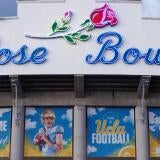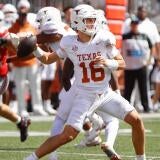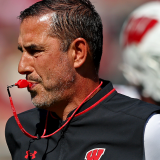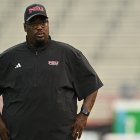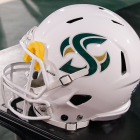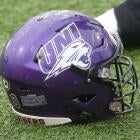The Streak: Why Army has lost 14 straight to Navy and now has new motivation to win
The Black Knights have succumbed to the Midshipmen for more than a decade, and it hasn't been close

Like clockwork, Navy beats Army. Fourteen straight years ... over and over and over again.
It's one of the craziest streaks in college football considering Army led the all-time series 49-46-7 following its last win over Navy, which came less than two months after the 9/11 terrorist attacks. Army-Navy will always stand for more than the result on the field, but The Streak hovers over this rivalry these days.
It has been a burden on Army to overcome, and now it's a rallying point to honor a fallen teammate. It's additional pressure on each Navy team to stay perfect and not be the team to end The Streak. It's also a little bit of a downer for a series that would be even better if both teams occasionally won again.
"You always want to win the game," Navy legend Roger Staubach said in 2014, according to the Washington Post. "But it would be good for the rivalry for Army to win one."
Is this finally the year for Army? Can Navy limp in with a third-string quarterback after a demoralizing loss at the AAC Championship Game and hold off Army again?
"I think this is the best chance we've had in a couple years," Army linebacker Alex Aukerman said. "We're definitely going to go in with a winning mentality. Two years ago, it was like, 'If we play perfect, we can hang with them and win.' It's just slowly transitioning into, 'This is our game to lose this year.'"
How long has The Streak lasted? It's older than Facebook.
"There's a thing on Facebook I see that says nobody has ever posted on Facebook that Army beat Navy," Navy wide receiver Jamir Tillman said. "That makes it a little dangerous because you don't want to be complacent. But it gives you that extra awareness that you don't want to feel that loss."
Eleven straight Navy senior classes have left undefeated against Army. Some current Black Knights and Midshipmen were toddlers when Army last won.
Navy's Ken Niumatalolo, who is the first head coach in Army-Navy history to win his first eight games in the series, needs one win to move past Army's Earl Blaik (1941-58) for most Army-Navy wins. The average score during The Streak: Navy 31, Army 11.
But four of the past five games have been decided by seven points or less. In 2012, Army reached the Navy 14-yard line in the closing seconds before a bobbled handoff turned into a game-ending turnover.
Still, who loses to a rival 14 straight years? Right now in major college football, the answer is only Army. The nation's next-closest active streak is Wisconsin's 13 straight wins over Minnesota.
More fascinating is this question: Why has Navy won 14 straight years? Like most issues in the military and football, the answer begins and ends with leadership.
Army mistakes, Navy intelligence built The Streak
Author John Feinstein wrote the book "A Civil War" that followed a season inside the Army-Navy rivalry in 1996. He still closely follows the teams and traces the series' turning points back almost 20 years. Essentially, for the longest time, Navy made every right move and Army made every wrong one.
Decision 1: Fearing oblivion as more teams aligned with conferences, Army joined Conference USA in 1998 and 107 years of independence in order to play Cincinnati, East Carolina, Houston, Louisville, Memphis, Southern Mississippi, UAB and Tulane. The failed experiment lasted seven years. "They joined a conference in which they couldn't compete," Feinstein said. "The only school like them academically was Tulane. Everybody else was getting junior college players."
Decision 2: Then-Army athletic director Rick Greenspan fired coach Bob Sutton, who went 44-55-1, and hired Todd Berry from Illinois State. Berry wanted to prove service academies could win with the spread offense and ended 16 seasons of Army using the wishbone. C-USA opponents, of course, had far more speed than Army.
"I remember Berry telling me, 'We're going to go out and recruit guys who can run 4.4 40s and we're recruiting guys against Georgia and Florida State,'" Feinstein said. "Well, even if you got any of those guys -- and you weren't going to -- they weren't going to last at West Point academically or militarily if they were that into football. They got worse basically every year."
Decision 3: Berry, who coached Army to its last win over Navy, went 5-35 and got fired midway through a 0-13 season in 2003. Meanwhile, the Mids fired Charlie Weatherbie in 2001 as Navy went 1-20 during his final two seasons. The Mids brought back former assistant and triple-option expert Paul Johnson from Georgia Southern, and he went 8-5 in his second season. Niumatalolo joined the staff as an assistant. Navy has gone to a bowl in 13 of the past 14 seasons.
Decision 4: When Berry flamed out, Army bought into the glitzy resume of Bobby Ross, who coached in a Super Bowl and won a national title at Georgia Tech. Army won nine games in three years with Ross and his West Coast offense. Assistant Stan Brock was hastily promoted, and though Army used the option again with the "Brock Bone Offense," the team went 3-9 in each of his two years.
Decision 5: Then-Army athletic director Kevin Anderson decided the program needed to go "back to the future," so he hired Rich Ellerson, who had West Point ties. "I strongly believe if Rich Ellerson can't turn this program around, I don't know if there is a coach who can," Anderson told the Associated Press in 2009. Ellerson did -- briefly. Army was 7-6 in 2010 and won its first bowl since 1985. Ellerson went 8-28 the next three years and got fired.
Decision 6: When Johnson left for Georgia Tech, Navy immediately promoted Niumatalolo, who hasn't missed a beat. Meanwhile, Army has gone through five head coaches since firing Sutton in 1999 and has just one winning season to show for it. Current Army coach Jeff Monken, who was a Navy assistant from 2002-07 and then head coach at Georgia Southern for four years, could add a second winning season. He's 6-5 this year with Navy and the Heart of Dallas Bowl vs. North Texas remaining.
"After all those years of failure, they still have a ways to go to catch up to Navy," Feinstein said. "It takes a long time coming back from being 0-13, especially at a place like Army. Monken knows how to coach against Navy. He knows Kenny. He knows how they think, what they do, and he's been able to keep the game more competitive the last couple years. With all the Navy injuries, this is as good a chance as Army has had to win in a long time."
Army won on the road this year over AAC champion Temple and Wake Forest. Monken is proud of his players but not satisfied with 6-5. He doesn't see why Army can't be as successful as Navy, which has averaged almost nine wins a year since 2003 and flirted with a Cotton Bowl bid in 2016.
"Why not?" Monken said. "We've got a lot more freshmen and sophomores playing than they do, but pretty soon we're going to have veteran guys. We're not recruiting different guys. We go head to head with them a lot, and we win plenty. Going off last year's recruiting class, we beat them on as many guys as they beat us on."
Air Force won the Commander-in-Chief's Trophy this season by beating Army and Navy. No service academy sells NFL dreams, national championships and 100,000-seat stadiums, of course. They sell education, discipline, military service and connections for a serviceman's future.
There's a theory by some observers of service academy football that it's easier to win games at Navy and Air Force because the military duties connected to West Point are more difficult. Thus, the theory goes, it's harder for Army coaches to recruit players.
"There's something to that, especially when we're at war because more people in the Army die than in the Navy or Air Force," Feinstein said. "That's obviously something Navy and Air Force use in recruiting. The other is just the idea of being in the Navy is a lot more glamorous than being in the Army.
"What Navy people will say is, 'Oh, so do you want to go to Navy and fly and be on out on a ship, or do you want to go to Army and crawl through mud?' It is a factor in recruiting, and it's something the best Army coaches have been able to overcome through the years by selling the fact Army is such a good school academically."
Niumatalolo said he wouldn't know if the theory is correct since he doesn't see the duties for Army cadets. "I know what they go through here is really hard," he said. "It's tough to go to any service academy."
Said Monken: "Oh, I think there's an attempt to use that against us. But I think there's a lot of things in the Army that makes it more attractive than doing other things in the military. I'm not going to throw mud at anybody. Navy is a great school. Kenny is a dear friend."
Monken said only about 200 of 1,100 West Point graduates each year go into infantry. "So you talk about crawling around in the mud, eating dirt -- there's not as many as you think," he said. "You have to finish very, very high in your graduating class to get infantry because it's the most popular branch."
Army plays for fallen teammate
The Streak lives on this week, even as both coaches spout clichés about the past meaning nothing. That may be true, but the past keeps returning every year at this time.
"Our team's not responsible for the last 14 years," Monken said. "The 2016 Army team is responsible for the 2016 game. I'm tired of hearing about The Streak. Everybody in our program is. We'd like to end The Streak, but we just want to go 1-0 this week."
Twenty years have passed since Navy offensive coordinator Ivin Jasper last lost to Army. He was a young Midshipmen assistant coach in 1996. That day, Army rallied from 18 points down for the biggest comeback in series history. The result gave Army its fifth straight win over Navy, tying the series record at the time, by a grand total of 10 points.
"It's indescribable when you lose this game," Jasper said. "With all due respect to Michigan-Ohio State, USC-UCLA, Florida-Florida State, Florida-Georgia -- all the big rivalries -- there's a lot more to this game. These kids are playing for their country first of all, and the guy next to him. None of these kids are going to the NFL. They're playing for pride that, 'I beat my rival and then I'm going to go serve next to this guy and serve our country.' When you don't win this game, it's just over and it's really, really tough."
This year, Army is playing for starting cornerback Brandon Jackson, who died at the age of 20 on Sept. 11, 2016, in a car crash hours after the Black Knights' victory over Rice. Niumatalolo and members of his staff went to the funeral of Army, just like Monken and some Army players attended the funeral of Navy running back Will McKamey in 2014.
"Brandon was a great, great kid," Monken said. "He was beloved by his teammates and had an unbelievable spirit. Beyond that, he's a terrific player. We miss him on the field. He made a lot of plays."
Monken initially canceled practice on the day of Jackson's death. But Army's captains unanimously decided to practice, believing Jackson would have wanted them to and so they could channel their grief into something else.
Before every game, Army now runs onto the field behind linebacker James Gibson (who wears No. 2) and slotback Christian Drake (who wears No. 8). Put them together and it's 28 -- Jackson's number.
"It's just one of the saddest times of my life," said Aukerman, a linebacker at Army. "We're all going through the same struggle losing him so it definitely brought us closer. I think we're playing out there like he's with us. Everything he stood for when he was on this team and his confidence out on the field, we're just trying to adopt that, too."
Jackson used to have a saying: "Scared money don't make no money." He meant he wasn't backing down from any opponent.
"I say it to myself all the time now," Army linebacker Andrew King wrote this week in an article for The Players' Tribune. "You have to just go out and go for it. You can't be afraid of failure. And for the last 14 years, Army has failed against Navy every single time. Every. Single. Time. Not even a tie. If we want to beat them -- and we do -- we can't be afraid of losing. Scared money don't make no money."


